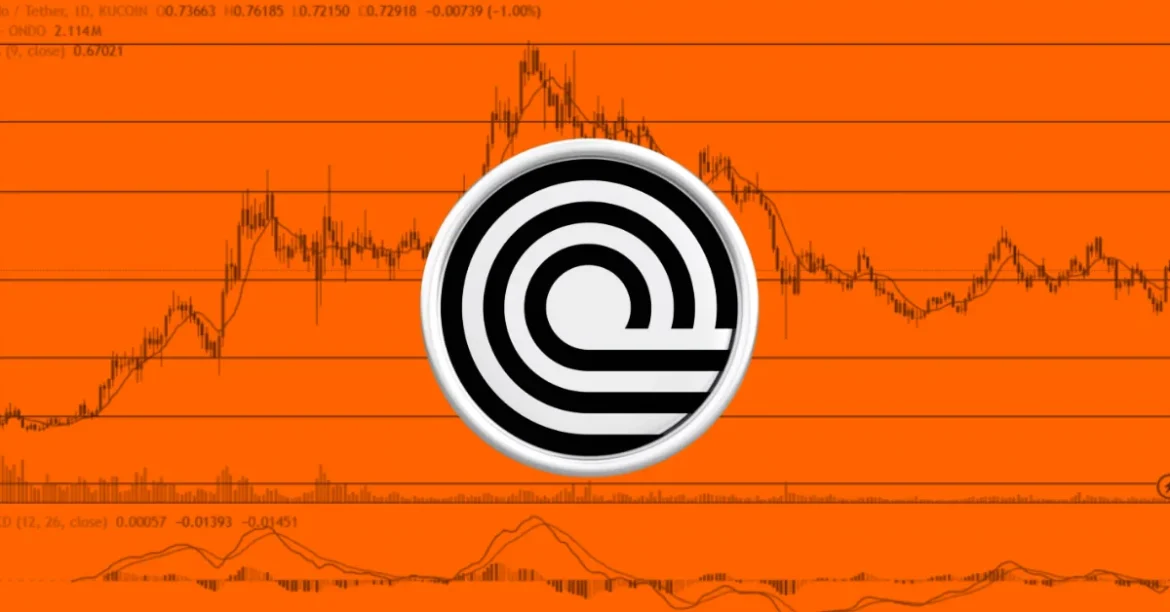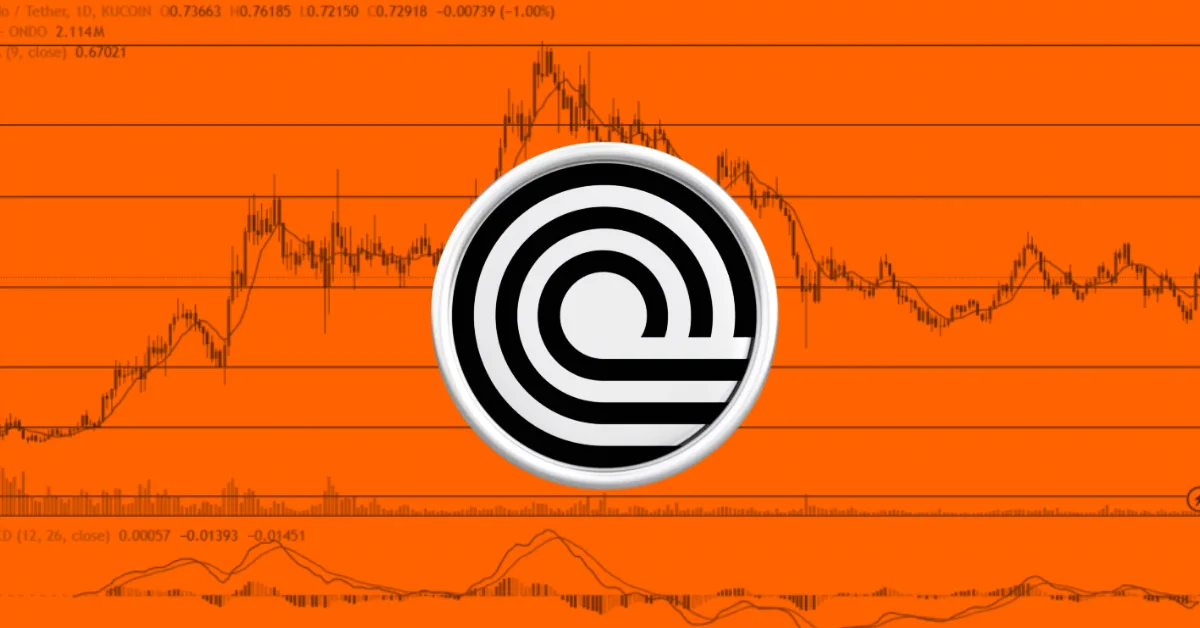The Convergence of TradFi and DeFi: Analyzing 21Shares’ Spot ONDO ETF Filing
Introduction: A New Era of Financial Innovation
The financial landscape is undergoing a profound transformation, driven by the convergence of traditional finance (TradFi) and decentralized finance (DeFi). At the heart of this evolution lies the tokenization of real-world assets (RWAs), a trend that is reshaping how investors interact with assets ranging from real estate to fixed-income securities. The recent filing by 21Shares with the U.S. Securities and Exchange Commission (SEC) for a spot ONDO exchange-traded fund (ETF) represents a pivotal moment in this journey. This report explores the implications of this filing, its potential impact on the market, and the broader significance for the future of finance.
The Rise of Real-World Asset Tokenization
Tokenization, the process of representing ownership of real-world assets as digital tokens on a blockchain, has emerged as a disruptive force in the financial sector. The total on-chain value of tokenized assets has surpassed $25 billion, a testament to the growing interest and adoption of this technology. The benefits of tokenization are manifold, offering a range of advantages that traditional financial instruments struggle to match.
Increased Liquidity and Accessibility
One of the most significant advantages of tokenization is the enhanced liquidity it provides. Traditional assets, such as real estate or private equity, are often illiquid, meaning they cannot be easily bought or sold without significant time and effort. Tokenization addresses this issue by enabling fractional ownership, allowing investors to buy and sell portions of an asset rather than the entire asset itself. This fractionalization makes high-value assets accessible to a broader range of investors, democratizing access to investment opportunities that were previously reserved for institutional players.
Transparency and Security
Blockchain technology, the backbone of tokenization, offers unparalleled transparency and security. Every transaction is recorded on an immutable ledger, providing a clear and auditable trail of ownership and transfers. This transparency reduces the risk of fraud and enhances trust among investors. Additionally, the decentralized nature of blockchain ensures that assets are secured through cryptographic techniques, making them resistant to tampering and unauthorized access.
Efficiency and Cost Reduction
Tokenization streamlines administrative processes, reducing the need for intermediaries and lowering transaction costs. Traditional financial transactions often involve multiple intermediaries, each adding layers of complexity and cost. By automating these processes through smart contracts, tokenization eliminates the need for intermediaries, accelerating settlement times and reducing fees. This efficiency not only benefits investors but also makes the financial system more inclusive and accessible.
21Shares’ ONDO ETF: Bridging the Gap Between DeFi and TradFi
21Shares, a leading issuer of crypto exchange-traded products (ETPs) and ETFs, has taken a significant step towards bridging the gap between DeFi and TradFi with its filing for a spot ONDO ETF. This move is part of a broader trend of institutional adoption of digital assets, as traditional financial institutions seek to capitalize on the opportunities presented by the tokenization of real-world assets.
The Role of Ondo Finance
Ondo Finance, the platform behind the ONDO token, is at the forefront of the tokenization revolution. The company focuses on tokenizing fixed-income securities, connecting institutional investors with DeFi opportunities. Ondo Finance has made several strategic moves to solidify its position in the RWA space, including the acquisition of a broker-dealer, which enhances its ability to offer on-chain securities and comply with regulatory requirements.
The ONDO token plays a crucial role in the Ondo Finance ecosystem, serving as a governance token and potentially offering utility within the platform’s various products and services. The proposed 21Shares Ondo Trust ETF aims to track the performance of the ONDO token, providing investors with a regulated and transparent way to gain exposure to tokenized fixed-income securities.
Market Impact and Investor Sentiment
The announcement of the 21Shares ONDO ETF filing has already had a positive impact on the price of the ONDO token. Following the news, the price of ONDO jumped 2.3%, and the market cap hit $3.44 billion. Analysts predict a potential 2-3x surge in the token’s value, driven by increased demand and institutional adoption.
Several factors contribute to this optimistic market sentiment:
- Increased Demand: The ETF is expected to drive increased demand for ONDO tokens as investors seek exposure to the underlying asset.
- Institutional Adoption: The availability of an ETF could attract institutional investors who have previously been hesitant to invest directly in cryptocurrencies.
- Market Validation: The SEC filing validates the growing interest in tokenized real-world assets and the potential of Ondo Finance as a key player in this space.
The listing of ONDO on major exchanges, such as Binance US, further amplifies this effect, increasing accessibility and liquidity for the token. For example, ONDO soared from the daily low of $1.0583 to $1.1642, a 10% increase, following the announcement.
Regulatory Considerations and Challenges
While the 21Shares ONDO ETF filing represents a significant step forward, regulatory hurdles remain. The SEC has been cautious in its approach to crypto-related investment products, and several considerations could impact the approval process:
Custody and Security
The SEC will likely scrutinize the custody arrangements for the ONDO tokens, ensuring that they are stored securely and protected from theft or loss. Coinbase Custody, a reputable custodian in the crypto space, will safeguard all ONDO tokens for the proposed ETF. This arrangement provides an additional layer of security and regulatory compliance, addressing one of the SEC’s primary concerns.
Market Manipulation
The SEC will also assess the potential for market manipulation in the ONDO market and whether adequate safeguards are in place to prevent such activity. The transparency and immutability of blockchain technology inherently reduce the risk of manipulation, but the SEC may require additional measures to ensure market integrity.
Regulatory Clarity
The lack of clear regulatory guidance for digital assets in the United States creates uncertainty and could potentially delay the approval process. However, the fact that 21Shares has filed for a spot ONDO ETF suggests that the company believes it can address the SEC’s concerns and obtain approval. The ongoing dialogue between regulators and industry stakeholders is expected to lead to clearer guidelines in the future, paving the way for more crypto-related investment products.
The Future of Finance: Tokenization as a Catalyst
The 21Shares ONDO ETF filing is not just about a single ETF; it represents a broader shift towards the mainstream adoption of tokenized real-world assets. As the DeFi ecosystem continues to mature and regulatory clarity improves, we can expect to see more traditional financial institutions embracing tokenization as a way to enhance efficiency, increase liquidity, and expand access to investment opportunities.
A Convergence of TradFi and DeFi
The successful launch of an ONDO ETF could pave the way for similar products that track other tokenized assets, further bridging the gap between DeFi and TradFi. This convergence has the potential to revolutionize the financial industry, creating a more inclusive, transparent, and efficient global financial system.
Enhanced Investment Opportunities
Tokenization opens up a world of investment opportunities that were previously inaccessible to many investors. By fractionalizing high-value assets, tokenization enables smaller investors to participate in markets that were once dominated by institutional players. This democratization of finance has the potential to unlock trillions of dollars in capital, driving economic growth and innovation.
A More Efficient Financial System
The integration of blockchain technology into traditional finance promises to streamline processes, reduce costs, and enhance security. Smart contracts, for example, can automate the execution of agreements, reducing the need for intermediaries and minimizing the risk of human error. This efficiency not only benefits investors but also makes the financial system more resilient and adaptable to change.
A Tokenized Future Beckons
The 21Shares filing for a spot ONDO ETF is a beacon signaling the future of finance. It represents a bold step towards integrating real-world assets into the digital realm, promising increased liquidity, fractional ownership, and enhanced transparency. While regulatory hurdles remain, the momentum behind tokenization is undeniable. This ETF, if approved, could be a watershed moment, ushering in an era where traditional and decentralized finance converge, creating a more accessible and efficient financial landscape for everyone.
As we stand on the precipice of this new era, it is clear that the tokenization of real-world assets is not just a trend but a fundamental shift in how we interact with finance. The 21Shares ONDO ETF filing is a testament to this transformation, and its potential approval could mark the beginning of a new chapter in the history of finance. The future is tokenized, and it is within our grasp.





